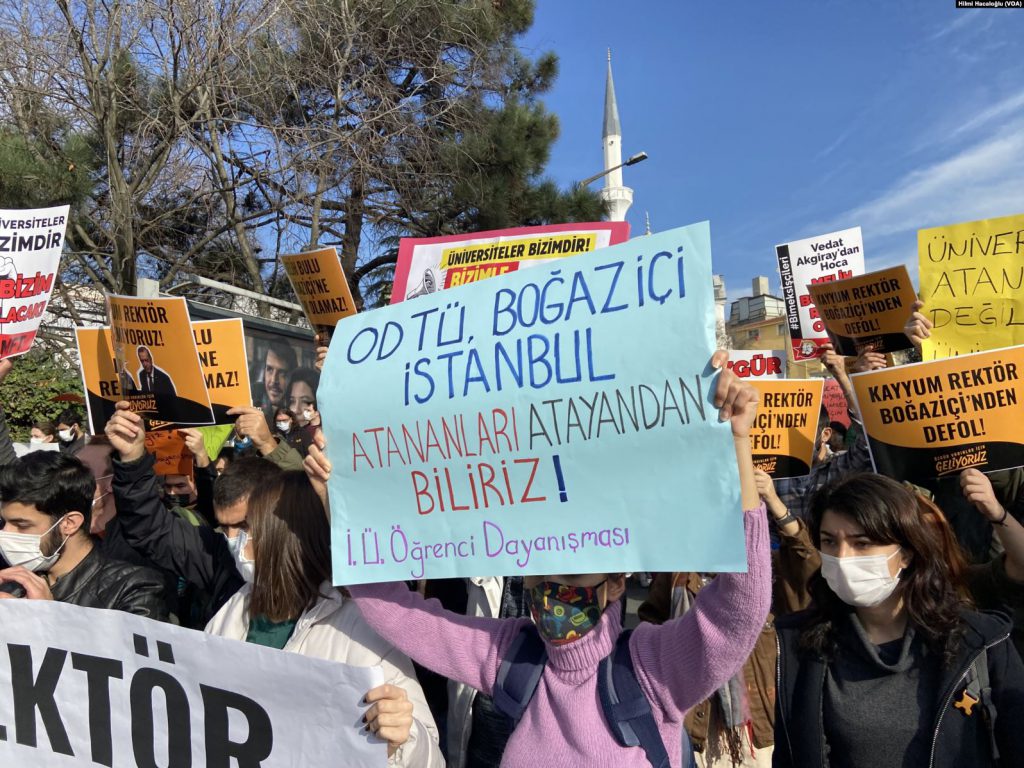The recent appointment of Turkish academic and close partisan of the ruling AKP party, Melih Bulu, as rector of Bogazici University, one of Turkey’s liberal strongholds, has triggered mass protests from both students and professors.
One action stood out among others: the display of a painting picturing the Kaaba covered with an LGBTI flag. Surprised by the determination and popularity of the protests, the ruling party seized this “opportunity” and widely shared the picture. Interior minister Suleyman Soylu went so far as to insult demonstrators using LGBTI-phobic and hateful slurs. In doing so, the authorities diverted the attention of the public from the antidemocratic crackdown and the police brutality. The students allegedly responsible for displaying the painting were arrested on the grounds of “inciting hatred”.
Such a visceral response from the authorities reveals a long-term strategy to weaken and crush LGBTI movements, and echo some of the concerns denounced in the ILGA 2020 Rainbow Europe report. In 2020, the authorities stated that all demographics were equally respected in the country, but omitted the word “LGBTI” from their reply to an open letter from the UN Special Rapporteurs on discrimination against the LGBTI community. They also failed to address the compatibility of Article 216§3 of the Turkish Criminal code (which imposes a prison sentence of up to a year for “public degradation of religious values”) with Article 19 of the International Covenant on Civil and Political Rights related to Freedom of Expression.
Instrumentalisation for electoral purposes
The recent events in Bogazici exemplify almost to perfection the AKP‘s (or Erdogan’s) strategy to play the “cultural war“ game. The objective is clear: manage discontent and gain (or safeguard) popularity amongst its core voters based in small Anatolian towns and rural, conservative areas.
It is becoming increasingly apparent that Turkey aims to be at the forefront of a new paradigm, a political alternative to a “globalised“ and “decadent Europe“. At the international level, Turkey has engaged in a normative contestation over human rights concepts, particularly regarding “gender equality“ and “LGBTI rights,“ which are fiercely rejected. At the national level, Erdogan frames LGBTI people as aliens, threats to Turkish society and representing Western influence.
The Bogazici event is not the first blow and, sadly, might not be the last, as this ‘familialist’, ‘anti-gender’ narrative is constitutive of Erdogan‘s politics. At national level, the AKP has established a repressive state apparatus to reinforce its power. It is now moving forward to the second component of Althusser’s theory by reinforcing its ideological hold on the society.
Erdogan’s hegemonic project of becoming a major actor in the Middle East and North Africa, regaining its past grandeur, is inherently based on ‘motherhood’ and the Turkish nation’s ability to “expand“. Feminists and LGBTI people represent major enemies for such a project and are therefore violently opposed.
Following the European Parliament who recently called on the Turkish authorities to “put an end to the judicial harassment of (…) lesbian, gay, bisexual, transgender and intersex communit[ies]”, the international human rights community should fight back.

